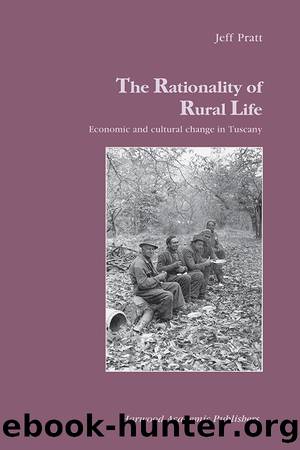The Rationality of Rural Life by Jeff Pratt

Author:Jeff Pratt [Pratt, Jeff]
Language: eng
Format: epub
Tags: Social Science, General, Anthropology, Sociology, Rural
ISBN: 9781000141306
Google: 2RX8DwAAQBAJ
Barnesnoble:
Goodreads: 55400974
Publisher: Routledge
Published: 2016-06-03T00:00:00+00:00
ACCOUNTING
I have suggested that an earlier generation of farmers was part of an economic system organised predominantly around the subsistence needs of the household, and that this generated a particular set of farming practices and economic virtues. The case material presented in this chapter raises the question of whether those practices and virtues have any validity today, or whether to the contrary farming now is and should be regulated by an entirely different set of criteria. The analytical problem, in short, is that of the rationality of these farming systems, and it can be broached in a number of different ways. One recent approach (Gudeman and Rivera 1990) explores models of economic life which are based on two modes of organization: the house and the corporation. The models are cultural constructions of economic practice and the contrast between them can be recognized in many of the conversations reported earlier in this chapter (6). In the conclusion to the book I shall return to the relevance of Gudeman and Riveraâs analysis to this Italian ethnography, but here I want to pursue the question of rationality from a slightly different direction.
At various points in this book comparisons have been made between the production costs and incomes of family farms and wage-labour estates. The comparisons rest on an accounting system used by estate managers, modified only to the extent that wage costs for a farming family are put at nil, and the income is called a âreturn to labourâ rather than profit. This modification is customary in farming studies, but the assumption that such a comparison is possible prejudges many of the issues which need to be examined. This is because accounting systems can only exist in certain historical conditions, and contain within them many assumptions about the nature of economic activity. An examination of these assumptions and their relevance to family farmers will provide a framework for a discussion of some of the experiences recounted in the first section of this chapter. The strategy here is not to delineate two models with contrasting economic purposes, but rather to draw attention to the stages by which âthe houseâ has been transformed and partially absorbed into the dominant mode of economic operation, âthe corporationâ. Thus my approach has a different emphasis from that of Gudeman and Rivera (1990), and it also draws attention to accounting as a particular form of knowledge, and as an exemplification of a particular kind of economic rationality. The nature and universality of that rationality has also emerged as one focal point in a recent debate in rural sociology about the relationship between capitalism and simple commodity production.
We saw in the Introduction that Max Weber gave a central position to accounting in his analysis of rational economic activity. However it also became clear that there were problems with his distinction between formal rationality, concerned with the means adopted in economic action, and material or substantive rationality concerned with the values or goals of that action (7). These problems have sometimes
Download
This site does not store any files on its server. We only index and link to content provided by other sites. Please contact the content providers to delete copyright contents if any and email us, we'll remove relevant links or contents immediately.
Nudge - Improving Decisions about Health, Wealth, and Happiness by Thaler Sunstein(7709)
The Fire Next Time by James Baldwin(5447)
iGen by Jean M. Twenge(5417)
Adulting by Kelly Williams Brown(4576)
The Sports Rules Book by Human Kinetics(4388)
The Hacking of the American Mind by Robert H. Lustig(4383)
The Ethical Slut by Janet W. Hardy(4258)
Captivate by Vanessa Van Edwards(3840)
Mummy Knew by Lisa James(3693)
In a Sunburned Country by Bill Bryson(3544)
The Worm at the Core by Sheldon Solomon(3487)
Ants Among Elephants by Sujatha Gidla(3467)
The 48 laws of power by Robert Greene & Joost Elffers(3293)
Suicide: A Study in Sociology by Emile Durkheim(3024)
The Slow Fix: Solve Problems, Work Smarter, and Live Better In a World Addicted to Speed by Carl Honore(3010)
The Tipping Point by Malcolm Gladwell(2927)
Humans of New York by Brandon Stanton(2873)
Get What's Yours for Medicare: Maximize Your Coverage, Minimize Your Costs by Philip Moeller(2742)
Handbook of Forensic Sociology and Psychology by Stephen J. Morewitz & Mark L. Goldstein(2705)
